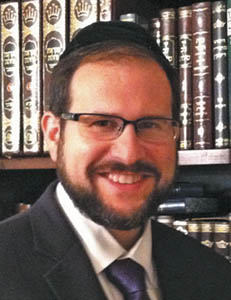
It was definitely one of the most unique gifts I ever received. Since it was given to me, I am hardly ever apart from it. This may sound funny, but when it’s with me I constantly feel embraced, as if in a bear hug. This gift understands me and my needs better than anyone I know. It’s flexible in the sense that, on days when I need space, it will grant it to me, and on days when I need a stronger connection it will provide that as well. It supports me in ways few others can, and never leaves my side, unless I want it to. I can enjoy the gift based on my own level. It’s durable and uncompromising, and grows with me.
Can you think of a more endearing gift?
Flexibility is one of the most important character traits necessary for all successful human relationships. The ability to compromise and not stand on principle is one of the keys to getting along with others.
And yet there are times when one cannot, and must not, compromise. There are situations in which one must be unflinchingly rigid and unbending. Those are times when one’s ethics and beliefs are called into question.
Life is full of challenges wherein one must be able to walk a fine line, and not veer toward extremes. As a classic example, parents must be loving and accepting, yet they must also be demanding disciplinarians. Finding that delicate balance is never easy.
In a similar vein, as Jews, we have an obligation to be gregarious, pleasant and gracious. Being flexible and swallowing one’s pride for the sake of another is one of the hallmarks for living a Torah life. However, when our beliefs and adherence to halacha are challenged, we have to be obstinate and inflexible. After all, halacha is not ours to tamper with, but rather directives that we are bound to follow.
In Parshat Vayeshev, after Yosef was sold, the brothers banished Yehuda. The Torah states that Yehuda “went down from his brothers” and had to live away from his family for some time. That is when the whole ordeal with Tamar occurred.
The Gemara (Sanhedrin 6b) states that anyone who praises Yehuda for his compromise with Yosef is considered a blasphemer. Shimon and Levi had suggested that they kill Yosef, while Reuven wanted to save him. Yehuda had suggested that they sell him. Yehuda’s compromise was deemed inappropriate. If Yosef was truly deserving of death (because they deemed him a rodef—see Sforno) they should have killed him. If he was worthy of being saved, Yehuda should have urged them to bring him home. But compromising ultimately accomplished nothing.
There is no time of year that serves as a greater reminder for this concept than Chanukah. In an age of political correctness, where everyone is afraid to speak the truth, the message of Chanukah is ever so vital. We are charged with being like the holy Maccabees, prepared to stand our ground in regard to our adherence to the precepts of Torah and Halacha.
We would be wise to remember that we are not the defenders of the Torah, but rather the upholders of the Torah. We must never be apologetic for our beliefs.
Isn’t it fascinating that the two components of the Chanukah holiday contain these two polar-opposite expressions? They went to war with a feeling of defiance and unrepentant religious zeal. The miracle of the Menorah, however, was only able to occur because the Maccabees subjugated themselves to the opinion of their leadership in deciding what to do with that one jug of oil. The delicate balance of inflexibility and subjugation.
I conclude by expressing again how thankful I am for the gift I received this Chanukah. For what is more embracing, supporting and yet flexible than… a belt. (I could have thrown in that it’s also hole-y, but that would have been corny.)
It may seem like a lame gift, but when you don’t have a belt you really learn to appreciate its importance and value. And after a few doughnuts and latkes, its flexibility is all the more important.
By Rabbi Dani Staum
Rabbi Dani Staum, LMSW is the rabbi of Kehillat New Hempstead, as well as guidance counselor and seventh-grade rebbe in ASHAR, pincipal at Mesivta Ohr Naftoli of New Windsor, and a division head at Camp Dora Golding. He also presents parenting classes based on the acclaimed Love and Logic methods. His email address is: [email protected]. His website is: www.stamtorah.info.













